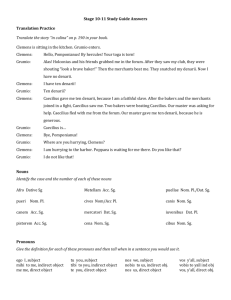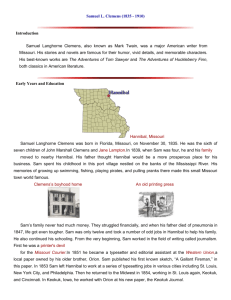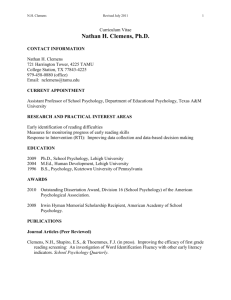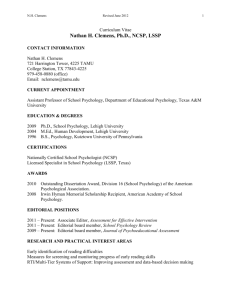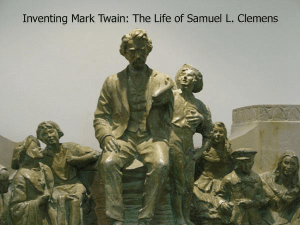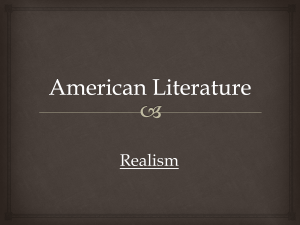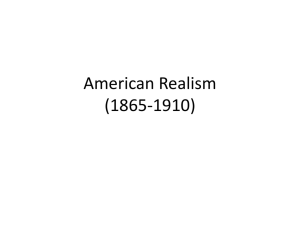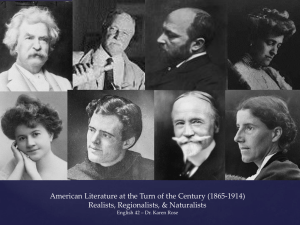The Life and Works of Mark Twain
advertisement
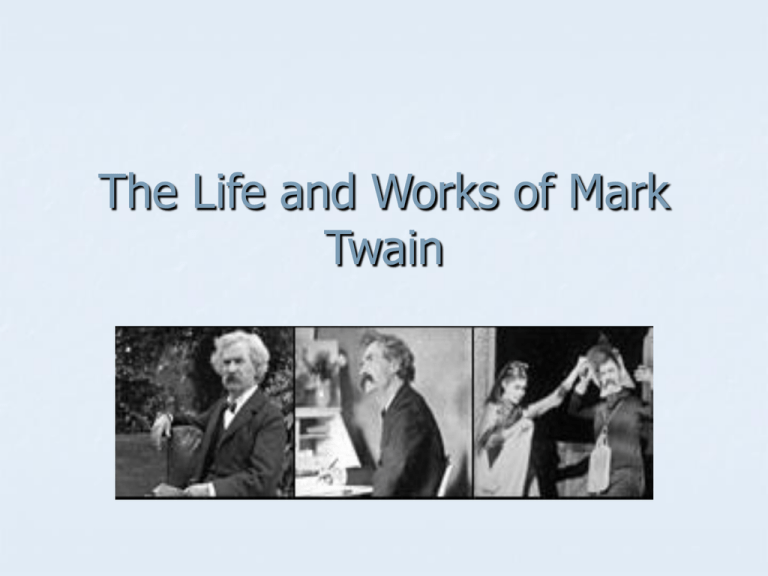
The Life and Works of Mark Twain “Every time you stop a school, you will have to build a jail. What you gain at one end you lose at the other. It's like feeding a dog on his own tail. It won't fatten the dog.” Samuel Clemens (Mark Twain) is recognized as one of the best American writers of all time. His work and criticism of society is still relevant today. Samuel Clemens 1835-1910 Grew up in the frontier town of Hannibal, Missouri on the banks of the Mississippi River Spent many summers playing in the slave quarters of his uncle’s farm Father died when Clemens was only 11 forcing him to leave school and go to work Early Work 1847 - Became a printer's apprentice for a local newspaper to help support family Arranged the type for each of the newspaper's stories, allowing Clemens to read the news of the world while completing his work. 1853 – 1857 Worked in New York and Philadelphia writing articles for several newspapers (was fired for writing stories that had not happened yet). 1857 – Returned home to become a riverboat pilot on the Mississippi River Civil War Years During the Civil War, Twain formed a Confederate militia known as the "Marion Rangers." The militia disbanded after approximately two weeks. Traveled from Missouri to Nevada by stagecoach in search of silver It was during these years that Clemens first witnessed mistreatment of Native Americans. Suffered many disappointments and mishaps Life and Works 1865-Clemens published one of his short stories, "Jim Smiley and His Jumping Frog" in papers across the country. The popularity of this story brought notoriety and a full time writing job His writings were so popular that, one year later, he embarked upon his first lecture tour, which established him as a successful stage performer. Olivia Langdon Daughter of a very wealthy coal businessman Met Samuel Clemens in 1867 through her brother Charles First date was to a reading by Charles Dickens in New York City. Courted her mainly by letter She rejected his first proposal, but they became engaged two months later In February 1870, they were married. The Honeymoon Period Langdon’s father bought the couple a house in the nicest part of New York A few years later, they sold the house and built the house of their dreams in Connecticut (pictured). Life and Work 1870-Married Olivia Langdon, she gave birth to son, Langdon 1871-Moved to Hartford, Connecticut to be closer to his publisher, Langdon dies 1872-Published his famous book, Roughing It, which detailed his early experiences 1873-Clemens began to focus his writing on social criticism The Nature of his Prose As Clemens traveled around the country, he found much of what he saw, contemptuous Slavery Treatment of the Native Americans Greed Hypocrisy Abuse of power (this will be a theme throughout all of Twain’s work) The Nature of his Prose Clemens used his writing as a forum to express his feelings Instead of coming right out and saying what he was upset about, he wrote fictitious stories that made fun of the behaviors he disliked This type of writing is known as Satire The Nature of his Prose When Clemens was writing, there was a shift in writing style from romanticism to realism Romanticism - stressed strong emotion as a source of aesthetic experience, placing new emphasis on such emotions as trepidation, horror and awe Ex: “The Good old days, Golden Years Realism - emphasizes how life really is, rejects sentimental or emotional notions Realism addresses social problems through believable characters (What makes these characters believable?) Life and Work 1874-1891 Clemens and his family (which now included three daughters) lived in Hartford and he made a substantial living and created many of his masterpieces The Adventures of Tom Sawyer (1876) Life on the Mississippi (1883) The Prince and the Pauper (1881) A Connecticut Yankee in King Arthur's Court (1889) Adventures of Huckleberry Finn (1884) Life and Work Clemens made plenty of money but always invested it poorly 1891- his publishing company failed and Clemens was forced to file for bankruptcy He moved his family to Europe while he worked to pay off his debts Life and Work Clemens was able to pay off his $100,000 in debt by doing lecture tours around the world People paid good money to go to these lectures because Clemens extremely funny Life and Work Clemens stayed in Europe until 1900 when his debt was paid off His time there exposed him to even more human cruelty than he had witnessed in America (slavery, treatment of Native Americans, etc.) His writing took a dark turn but much of his antigovernment work was not published until after his death Life and Work 1903 – Olivia became sick and Clemens took her back to her home in Italy where she later died 1903-1909 Clemens continued to give lectures and write 1909- one daughter married and another died of an epileptic seizure April 21, 1910, Samuel Clemens died The Clemens Children Olivia Susan Clemens (1872-1896) A very sickly child Was close to her father and is commonly referred to as his favorite Her death sent him into a great depression The Clemens Children Clara Langdon Clemens (1874-1962) Very well educated and often traveled with her father Clara was determined during her lifetime to preserve her father's image as a lovable, innocent humorist Died of a drug and alcohol overdose The Clemens Children Jane Lampton Clemens (1880-1909) Very sickly -father was very protective of her Was involved in animal rights and several hobbies 1904-went crazy and tried to kill the housekeeper-had to go to a sanatorium Drowned during a seizure in the bathtub Language 1884- The Adventures of Huckleberry Finn- first book of its kind Breaks the racial barrier Use of word “nigger” Shows African Americans as humans with emotions, opinions, hopes, dreams Not any different from whites’ emotions, opinions, hopes, dreams Characters The characters in Clemen’s works were often modeled after people he knew Tom Sawyer and Huck Finn are representations of himself “Training is everything. The peach was once a bitter almond; cauliflower is nothing but cabbage with a college education. “ It is through the work of Clemens that we get a glimpse of late 19th century America The wit and humor or Clemens is rivaled by none
